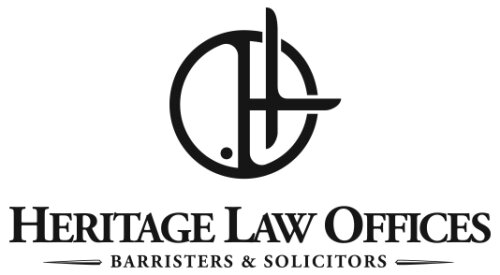Best Health Care Lawyers in Canada
Share your needs with us, get contacted by law firms.
Free. Takes 2 min.
Or refine your search by selecting a city:
List of the best lawyers in Canada
About Health Care Law in Canada
Health care law in Canada involves the regulations and legislation that govern the delivery of health care services, the relationship between health care providers and patients, and the rights and responsibilities of both parties. Canada's health care system, often referred to as "Medicare," is publicly funded and administered on a provincial or territorial basis, within guidelines set by the federal government. Each province and territory has its own health care insurance plan, covering hospital and doctor services, with additional differences in coverage for services such as dental care, prescription drugs, and optometry depending on the jurisdiction. As a result, health care law can vary substantially across regions.
Why You May Need a Lawyer
There are several situations in which individuals may require legal assistance in the health care sector. Some common scenarios include:
- Disputes with health care providers or institutions regarding the quality of care or medical malpractice.
- Issues concerning patient rights and informed consent.
- Navigating complex health insurance claims and disputes.
- Legal challenges related to long-term care facilities and elder care.
- Privacy concerns related to personal health information under laws such as the Personal Information Protection and Electronic Documents Act (PIPEDA).
- Understanding your rights as a patient or caregiver under provincial or territorial health legislation.
Local Laws Overview
Health care laws in Canada are largely shaped by provincial and territorial governments, but there are several key aspects that apply nationally that are particularly relevant, including:
- The Canada Health Act: This federal legislation outlines the principles under which provincial and territorial health insurance plans must operate, including universality, comprehensiveness, accessibility, portability, and public administration.
- Privacy Laws: PIPEDA and provincially specific regulations govern the collection and handling of personal health information, ensuring the protection and privacy of individuals' health information.
- Consent to Medical Treatment: Each province has laws regarding the necessity of obtaining informed consent before administering medical treatment, emphasizing the autonomy and rights of patients.
- Medical Malpractice: Provincial laws define the processes for pursuing claims against health care providers for negligence or substandard care.
Frequently Asked Questions
What does the Canada Health Act cover?
The Canada Health Act ensures that all Canadians have access to medically necessary hospital and physician services based on need, not the ability to pay. It sets national standards, but delivery of health care services is managed by the provinces and territories.
How can I file a complaint against a health care provider?
Complaints can be registered with the regulatory body governing the specific health care provider in your province. For instance, doctors are typically regulated by a College of Physicians and Surgeons in each province.
What are my rights regarding informed consent?
You have the right to receive information about your health status, treatments, and alternatives in a way you can understand before consenting. This also means you can refuse treatment after being informed of the potential outcomes.
How is my personal health information protected?
Your personal health information is protected under federal laws like PIPEDA and corresponding provincial legislation. Organizations must have policies to manage this information securely and must obtain permission for its use.
What is medical malpractice, and how do I address it?
Medical malpractice occurs when a health care professional provides negligent treatment that results in injury or harm. You may seek legal advice to explore filing a claim for compensation.
Are prescription drugs covered under health care plans?
Prescription drug coverage varies by province. Many provinces offer some level of coverage for certain demographics, such as seniors or those with low income, through supplemental insurance plans.
How can I access health care services if I am new to Canada?
New residents should apply for health insurance in their province or territory as soon as possible. Some provinces impose a waiting period, so it is advisable to have private insurance during this time.
What are the implications of Canada's health care system on private medical care?
While Canada’s system emphasizes public provision of care, private health care services do exist and are used for services not covered by provincial plans, or to obtain faster access to services in some cases.
Do international students have access to Canada's health care services?
International students may have access to provincial health care plans, depending on the province. In cases where they do not qualify, they will need to purchase private health insurance.
What should I do if a loved one is in long-term care and I am concerned about their treatment?
You can file a complaint with the relevant health care authority in your province or contact agencies that oversee long-term care facilities. Legal advice may also guide you in navigating these concerns.
Additional Resources
Here are some resources that can be helpful for obtaining legal advice or more information about health care in Canada:
- Canadian Institute for Health Information (CIHI)
- Health Canada
- Provincial and Territorial Health Ministries
- Canadian Medical Protective Association
- Canadian Patient Safety Institute
- Office of the Privacy Commissioner of Canada
Next Steps
If you require legal assistance in health care, consider taking the following steps:
- Research and identify a qualified health care lawyer in your area.
- Contact your provincial or territorial Law Society for referrals to lawyers specializing in health care law.
- Prepare documentation and records relevant to your issue to facilitate your lawyer's understanding of your case.
- Consult with the lawyer to explore your legal options and next steps based on their guidance and advice.
Remember, legal advice tailored to your specific circumstances is crucial for addressing issues effectively within Canada’s health care system.
Lawzana helps you find the best lawyers and law firms in Canada through a curated and pre-screened list of qualified legal professionals. Our platform offers rankings and detailed profiles of attorneys and law firms, allowing you to compare based on practice areas, including Health Care, experience, and client feedback.
Each profile includes a description of the firm's areas of practice, client reviews, team members and partners, year of establishment, spoken languages, office locations, contact information, social media presence, and any published articles or resources. Most firms on our platform speak English and are experienced in both local and international legal matters.
Get a quote from top-rated law firms in Canada — quickly, securely, and without unnecessary hassle.
Disclaimer:
The information provided on this page is for general informational purposes only and does not constitute legal advice. While we strive to ensure the accuracy and relevance of the content, legal information may change over time, and interpretations of the law can vary. You should always consult with a qualified legal professional for advice specific to your situation.
We disclaim all liability for actions taken or not taken based on the content of this page. If you believe any information is incorrect or outdated, please contact us, and we will review and update it where appropriate.
Browse health care law firms by city in Canada
Refine your search by selecting a city.












